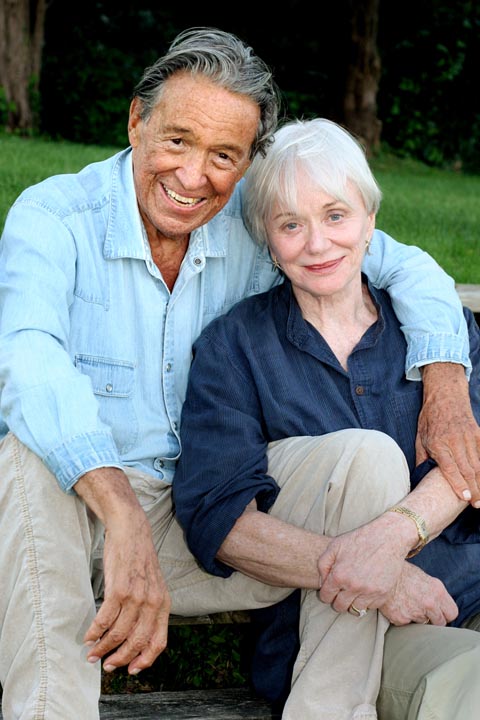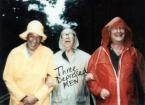Editor’s Note: Mike Wallace wrote the following piece for Peter Simon’s book On the Vineyard II, published in 1990. It appears here with permission. Mr. Wallace died on April 7 at the age of 93.
Something extraordinary happens each time I leave my “real” life in New York city and arrive at home in Vineyard Haven. All the magic of my schoolboy excursions to the Vineyard comes flooding back, all the early memories.
I remember, from my first visit to the Island when I was in my teens, the gulls soaring above the ferry on the way over from Woods Hole; I can hear the chains and the gangplanks; I can see the people and bikes getting off; I recall the salty smell of the sea.
For some inexplicable reason, whenever I get here and settle in for awhile, the world outside evaporates. The Vineyard is the only place I know where I somehow feel totally, utterly relaxed; people who know me from that other world find the change difficult to fathom in a person they normally perceive as driving and intense.
When I’m here I feel a peculiar sense of roots. My childhood home was Brookline, so perhaps it’s because of my Massachusetts background. But it’s also the memory that my mother and father vacationed here each summer, plus the simple fact that the Vineyard represents some of the happiest times of my life. My home today looks over Vineyard Haven Harbor, and as I watch the ferries come and go each day, all those early feelings still come back.
After spending part of my childhood summers here with my parents in Vineyard Haven, I returned for the first time in 1951 with my first wife and daughter, almost on a whim, and stayed at the Harborside in Edgartown. We spent the next five summers at other spots in Edgartown, but eventually realized that all our best friends lived in Vineyard Haven. I think it’s the simplicity here that attracts me. It’s such a plain place to live, but plain in the finest sense of the word. Probably because Vineyard Haven is a “dry” town, it has magically retained its essence through the years, it hasn’t changed substantially since I first started visiting my folks at the Tashmoo Inn (now the Vineyard Montessori School). There’s nothing self-conscious or contrived about Vineyard Haven. It’s not advertising itself as “New England.” It’s kind of an old, comfortable shoe.
Life in the summer, just up Main street from “downtown Vineyard Haven,” often seems like an extended camp reunion. Each morning we pals check with each other to make plans for the day; lunch on the porch at the Vineyard Haven Yacht Club, perhaps the beach for a bit, tennis in the afternoon, then over to Le Grenier or the Blue Water Grille for dinner, where the main question is — who will bring the wine?
But the spine to a Vineyard summer for me is tennis. Almost every day begins with a battle against Bob Brustein up at Beverly Sills’ court in Lambert’s Cove. He’s ten years younger than I, and as I age, and only because of that, I vow, he has become the consistent winner; but whatever the outcome, it’s a great way to get the day going.
In the late afternoon, mixed doubles with Art Buchwald, Rose Styron and Lucy Hackney, a different kind of game. Mixed doubles is more sociable; laced with Art’s jokes, aimed — successfully — at ungluing our concentration. Occasionally Artie and I take on Rose and Lucy, and chivalry is forgotten. The slices and drop shots for which I am justly famous from Oak Bluffs to Menemsha, come into play, and without apology. To win is all.
Then we go back to Rose’s or Lucy’s for iced tea and instant analysis of the match just played. If Bill Styron is around, he gets quickly bored and leaves; he doesn’t much like instant replays. But he returns when talk turns to politics and gossip. They are all such pals that we’re able to rekindle ties each summer as if no time had passed from the previous year, even if we haven’t seen each other more than a couple of times during the off-season.
On the Island, while the things I’ve described take priority, I manage to stay in touch with the “real” world on the other side of Vineyard Sound. Each morning The Boston Globe and The New York Times, and evenings the TV news fill me in. And it’s a joy just to watch the political conventions, or the Ollie North hearings, or the Olympics and not have to actually work them anymore.
I recall on one occasion, though, during the Israeli invasion of Lebanon, CBS convinced me to go because Arafat had declared that I was the only one with whom he would talk. My wife tried to dissuade me; she felt it was too dangerous, and besides it was vacation time and I shouldn’t even think of going. I kept saying to myself, “I shouldn’t do this . . . I shouldn’t . . .” because at the end of a 60 Minutes season I’m fed up with all of the travel and cherish the notion of just staying put.
But in the end I convinced myself that this was an opportunity I just couldn’t pass up. During a previous 60 Minutes segment, Arafat had become particularly upset with me about the way the interview had gone, and I had a hard time believing he would grant me another one but I was curious. So I got myself to Damascus, took a taxi through the night to Beirut, and when I finally got there, Arafat’s press secretary said to me, “What are you doing here?” I said “What do you mean, I was told to come!”
And after a couple of days of back-and-forth it became apparent that they wouldn’t, in fact, let me see him. So back to the Vineyard with my tail between my legs, to friends who laughed at me for leaving in the first place. Why leave paradise for just another interview?
I’ve thought occasionally about combining my life here with my profession, but each time I think seriously about it, my instinct tells me to leave the place alone. The only time I was ever really close to doing a 60 Minutes piece was during the Chappaquiddick episode back in 1969. I moved about the Island talking to various people who were involved, but there was a reluctance to discuss it on camera, and we finally decided to skip it.
Generally, I avoid doing anything about the Vineyard, particularly a “the Vineyard-is-paradise-found” type of puff pieces, because that’s just not my beat. If another story of considerable proportion came along, like the Kennedy tragedy, I’d probably do it because of my special understanding of the locale, but there really aren’t any generic topics here to say to me “you simply must do that story.”
In some respects, the Vineyard is a microcosm of the country — with issues like the hospital, drugs, ecology, overdevelopment, economic hardship and affordable housing — but given the choice, I’d prefer doing those stories about other places.
The Vineyard already receives too much media exposure and there’s not much we can do about it. It’s just too alluring and unique to ignore. It is true that many people — too many during the summer — are drawn to visit; the media have created a curiosity, a mystique about the place. People want to find out for themselves what all the commotion is about. Summer residents who vacation here may resent the magazine and television coverage, the hordes of tourists and the traffic jams, but I have trouble believing that the year-rounders really mind, because ultimately it helps their pocketbooks and keeps the Island economically healthy.
The fact that some celebrated people choose to live here creates a sort of curiosity about the place. Why the Vineyard? Possibly because the alternatives aren’t as appealing. Nantucket somehow seems a trifle more self-conscious, and the Hamptons are New York city once removed; too trendy and incestuous. And the Cape is just too crowded.
The Vineyard fortunately, is protected because it’s less accessible. At some point, I suppose the Vineyard will reach its people limit and some measure will be taken to prevent further development; already various Island planning boards and commissions have been slowing things down. I just hope they continue turning down Art Buchwald’s plea to build a bridge over from Falmouth so he can get more gullible tennis partners who are willing to chase his lobs.







Comments
Comment policy »